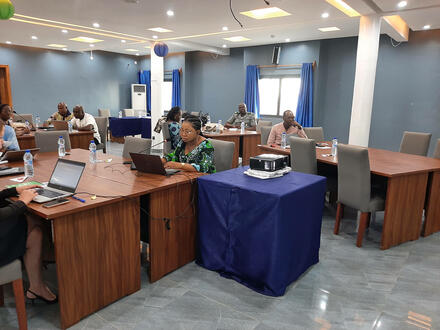More support for practical national planning
GARC and the Food and Agriculture Organization of the United Nations (FAO) have worked collaboratively over many years in leading the implementation of the Stepwise Approach towards Rabies Elimination (SARE) tool across Africa and Asia. During these collaborative workshops, the SARE tool is used by government stakeholders to undertake a self-evaluation of their country’s rabies situation and facilitates the development of a clear work plan that either supplements their existing National Strategic Plan or helps in the creation of one. Most importantly, these workshops are not designed as ‘talk-shops’ whereby participants have long discussions before the workshops ultimately lead to no action. In fact, previous SARE workshops have resulted in clear action by many countries that have undertaken them, resulting in the development of National Strategic Plans, the commencement of activities or the re-invigoration of national interest and political will. To highlight the massive scope of the work done, we are proud to share that there have been 30 in-country SARE workshops that have been held by the FAO and facilitated by GARC since 2018! That’s an average of more than 4 in-country SARE workshops per year for the last 7 years!
While we continue to implement these workshops in rabies-endemic countries in support of national stakeholders, we also continuously explore how to further improve them so that they can be even more impactful and helpful to the national stakeholders that invest their time and energy in rabies elimination efforts. Most recently in Benin, we made some key changes to the workshops by including additional practical exercises that helped to not only initiate immediate action after the development of the work plan, but also help to highlight how effective progress can be made – even in the most resource-limited settings.
Taking learnings from the regional PARACON meeting, we included a practical workshop on the use and implementation of the free GARC surveillance tools, putting the app directly into the hands of the stakeholders and allowing them to have a concrete understanding of the benefits and ease-of-use of these tools. These sessions are vital as they serve as a unique way for stakeholders to consider the implementation of these tools in the country. As these tools are offered free of charge by GARC, the effective implementation of this type of One Health monitoring and surveillance system in a country where such systems are often lacking can be rapid and relatively easy, with the full system capable of being implemented within a few weeks of the workshop. This means that the country’s ability to capture and analyze data in real time can be initiated at no cost (for the tools) and extremely quickly – empowering stakeholders to make data-driven decisions for effective implementation activities and truly boost their efforts to achieving rabies elimination. Furthermore, by implementing GARC’s surveillance tools, national stakeholders can improve the outcomes of any follow-up SARE assessments due to the improved capacity imparted by their routine use and benefits.

In addition, we developed a novel costing exercise where one activity in the country’s SARE-derived workplan was taken and costed by the participants. The important thing about this was that the GARC and FAO facilitators suggested ways to reduce costs and keep the implementation practical and feasible. This exercise helped to take the budget generated through the GDREP tool – something that can often be daunting and discouraging for countries that lack funding and support – and generate a realistic costing for an activity with a budget that can be sourced with relative ease. The exercise not only helps to highlight the importance of cost-saving wherever possible and thinking ‘outside of the box’ but it also helped to create a realistic and detailed budget for a workplan activity that could be used for funding proposals.
As we continue to support national governments and stakeholders in the development and implementation of national strategic plans, we will continue to improve approaches to make the workshops and engagements practical, efficient and impactful, with tangible outcomes and clear progress. By continuing, GARC and it’s partners like the FAO, will support a sustainable approach to achieving the global elimination of dog-mediated rabies.
Learn more about our global impact on this interactive map.
Article contributed by: Terence Scott, Director of Programs, GARC.